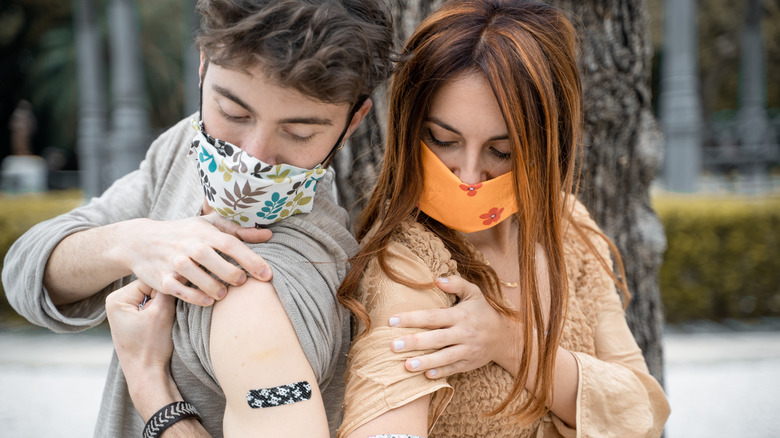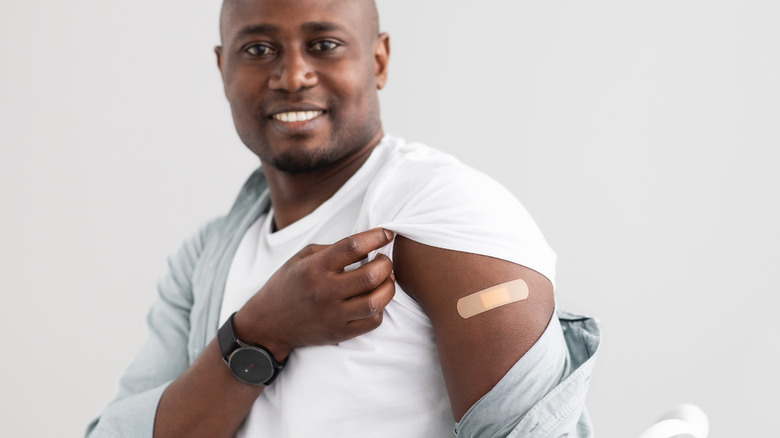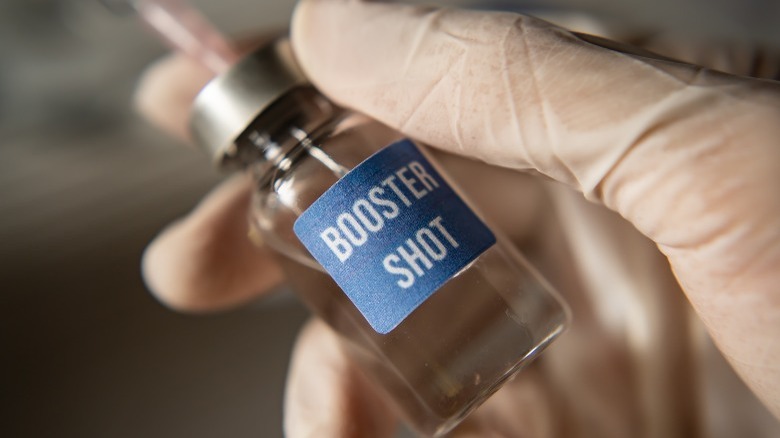Should Everyone Get A COVID-19 Booster Shot?
The Centers for Disease Control and Prevention Director Dr. Rochelle Walensky has announced her endorsement of booster shots for all Americans. This recommendation was expected and came on the heels of the unanimous recommendation of CDC advisors that all Americans who received Pfizer/BioNTech's and Moderna's Covid-19 vaccines should get a booster shot six months after receiving their second dose (via CNN).
"CDC continues to encourage the 47 million adults who are not yet vaccinated to get vaccinated as soon as possible to protect themselves, their families, loved ones and communities," the CDC said in a statement provided to CNN. The statement went on to say that the CDC strongly encourages all Americans who were not vaccinated to get vaccinated before visiting family over the holidays, and those who were previously eligible for booster shots to get booster shots before traveling to visit family.
Up until this announcement, the CDC had previously recommended booster shots only for members of the population who are 65 and over, adults with underlying medical conditions, and adults working or living in high-risk settings.
Get a booster shot to extend your protection from COVID-19
According to health experts at the University of Utah, available data indicates that COVID-19 vaccines become less effective over time, and that receiving a booster shot can help you defend yourself against the disease longer. They also cite a specific study out of Israel that followed 1.1 million people over the age of 60 who received a booster shot. Results of this study revealed that participants were roughly 20 times less likely to test positive for COVID-19. The experts at the University of Utah also point out that the use of booster shots is not a COVID-19-specific practice. There are vaccines for other diseases, such as tetanus and diphtheria, for which doctors have long recommended boosters.
COVID-19 boosters are essentially one more dose of the COVID-19 vaccine. "The concept is to prolong protective immunity, particularly if there is evidence that protection is waning after a period of time," Dr. Albert Shaw, a Yale Medicine infectious disease specialist, told Yale Medicine. "People get confused — or they think something is wrong — when guidance changes with COVID-19, but we have to remember that we are learning about this as we go," he further explained. Advising booster shots does not mean that the vaccines are failures. Instead, it is perfectly normal for vaccines to lose their potency over time.
Will a booster be effective against the Omicron variant?
During a December White House press briefing, Centers for Disease Control and Prevention director Dr. Rochelle Walensky stated that experts at the CDC were actively following the Omicron variant to get a better understanding of the new strain. She referenced the CDC's most recent Morbidity and Mortality Weekly Report (MMWR), which provided initial data on Omicron based on the first 43 known cases in the United States. Many more cases of Omicron have since been diagnosed throughout the country. Of these first 43 known cases, there was only one hospitalization and no deaths; 34 out of the 43 people were fully vaccinated and roughly a third of those 34 individuals had also received a booster shot.
"Although we don't have all the answers on the Omicron variant, initial data suggests that COVID-19 boosters help to bolster protection against Omicron," Dr. Walensky said. In one of the two latest studies out of Israel, Walensky noted that mortality was reduced by 90% for those that had a booster shot compared to those who did not receive a booster shot. In the other study, the severity of COVID-19 symptoms and infection was greatly reduced in those who had received a booster shot compared to those who did not. "It is clear that booster shots are a safe and effective way to prevent COVID-19 and to protect against the threat of new variants," Walensky continued.
White House Chief Medical Advisor Dr. Anthony Fauci supported Dr. Walensky's statement, adding, "The encouraging news is that booster doses increased the neutralizing antibody titers by 25-fold compared to two doses against the Omicron variant. A striking endorsement of the importance of boosting."
As more and more people get the booster shot as an added layer of protection, Dr. Walensky gave her assurance that she and her peers were "following the science." As of this reporting, over 50 million booster doses have been administered across the country. Walensky stated that she and her peers will continue to monitor reports on the safety of booster doses both nationally and internationally.


